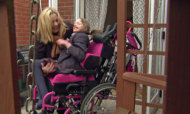Government plans to help families with disabled children have been announced - and billed by ministers as the biggest shake-up to the system for 30 years.
A number of measures will be introduced to simplify an existing set-up that has been deemed too complicated.
The current SEN (special educational needs) Statements - for children with severe disabilities - will be replaced by a new joined-up way of dealing with all aspects of care.
Education, health and social services will be forced to work together to provide a single plan for each child's needs.
Children's minister Sarah Teather said: "Thousands of families have had to battle for months, even years, with different agencies to get the specialist care their children need.
"It is unacceptable they are forced to go from pillar to post, facing agonising delays and bureaucracy to get support, therapy and equipment."
Fifteen-year old Jessie has septo-optic dysplasia, a condition also suffered by Katie Price and Dwight Yorke's son Harvey that means the optic nerve is underdeveloped and part of the brain is missing.
Her mother Jane Myers has found managing all the different aspects of her daughter's care very complicated.
She told Sky News: "It has been horrendous. I'm a mum, on my own and my focus is my family, but it is really tough trying to bring it all together and live every day, just trying to get by."
Children with special educational needs will have the right to seek a place at an academy or a free school under the plans, while parents will also be given legal powers to control personal care budgets.
And following reforms the government hopes to implement by 2014, the cut-off age for care will be raised from 16 to 25 years old to allow provision for further education.
At the other end of the scale, there will be tighter rules governing how children are identified as having SEN.
Official figures suggest around one in five schoolchildren - roughly 1.7m - are classed as having special needs.
Some charities though are concerned that children with less obvious disabilities could slip through the net.

No comments:
Post a Comment